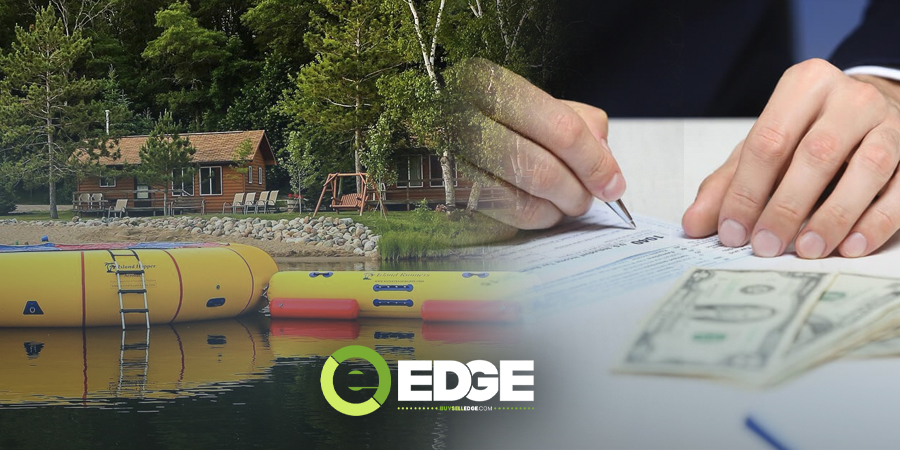How to Structure Seller Financing Safely
Seller financing means the seller carries part of the purchase price in the form of a loan to the buyer. It is most common in deals supported by SBA...
3 min read
 Allura Engel
:
Sep 23, 2025 7:30:00 AM
Allura Engel
:
Sep 23, 2025 7:30:00 AM

So, you’ve found the perfect business. The numbers look good, the customers are loyal, and the seller swears it’s the best thing since sliced bread. There’s just one tiny problem… you don’t have $900,000 sitting in your checking account.
Don’t worry, almost nobody does. The good news? Business acquisitions are rarely paid for in full at closing. In fact, most deals are like a good cocktail: a mix of ingredients blended just right.
Here’s how buyers really get deals done.
Purchase Price: $900,000
Buyer Cash: $150,000 (about 17%)
Seller Financing: $150,000
SBA Loan: $600,000
Every lender wants to know one thing: Are you willing to put your own money where your mouth is? That’s where your cash contribution comes in.
 The $150,000 buyer contribution in our example could come from:
The $150,000 buyer contribution in our example could come from:
Personal savings (a.k.a. years of skipping avocado toast)
Home equity line of credit (HELOC) (turning your house into a business partner)
Friends & family loans (because nothing says “holiday awkwardness” like still owing Uncle Joe money at Christmas dinner)
Most SBA lenders want at least 10% down. In this case, 17% makes you look like a serious player, not just someone who “read a book about entrepreneurship once.”
The SBA 7(a) loan is the workhorse of business acquisitions. Think of it as the golden retriever of financing: loyal, dependable, and a little paperwork-heavy.
In our example, the SBA covers $600,000. At 9% interest over 10 years, you’re looking at about $91,000 in annual payments.
Debt Service Coverage Ratio (DSCR):
This is banker-speak for, “Can the business actually afford this loan?”
Formula: DSCR = Cash Flow ÷ Annual Debt Payments
Example: $250,000 in annual SDE ÷ $91,000 in payments = 2.75
That’s comfortably above the 1.25 lenders require. Translation: the business makes more than enough to pay the loan and still keep the lights on.
Personal Guaranty:
Here’s the kicker — the SBA requires you to personally guarantee the loan. Yep, if the business flops, the bank can come after your house, car, or that rare sneaker collection you thought was untouchable. It’s a big commitment, but it also shows lenders you’re serious.
What SBA Lenders Look At:
The business (its cash flow, history, and stability)
The buyer (credit score, background, and experience)
So if you’re buying a restaurant but your only experience is eating at them, be prepared for some side-eye from the lender.
Sometimes the seller chips in too, by financing part of the deal. In our case, that’s $150,000.
Typical Terms:
12–36 month payback
Around 9% interest (they’re not running a charity)
A lien on the business assets until paid off (because trust only goes so far)
Example:
$150,000 over 24 months at 9% = about $6,850/month. Over two years, that’s $164,400 total, with $14,400 in interest — basically paying the seller for the privilege of buying their business.
The upside? It proves the seller believes the business can thrive under your leadership. After all, they’re literally betting on you.
 If you’re talented in your field but light on cash, you may have fans you don’t even know about: investors.
If you’re talented in your field but light on cash, you may have fans you don’t even know about: investors.
Say you’re an HVAC pro who knows ductwork better than most people know their in-laws. A wealthy investor who doesn’t know a wrench from a ratchet might jump at the chance to back you. You run the business, they bring the money. Everyone wins.
The trade-off: you give up some ownership. But hey, it’s better to own 70% of something real than 100% of a dream you couldn’t afford.
Here’s how our $900,000 deal shakes out:
$150,000 buyer cash (from savings, HELOC, or borrowing Aunt Linda’s rainy-day fund — just don’t forget her birthday)
$600,000 SBA loan (10-year term at 9%, DSCR tested, with your personal guarantee signed in blood… metaphorically)
$150,000 seller financing (24 months at 9%)
Everyone’s got skin in the game. Everyone’s motivated. And suddenly, owning that $900,000 business doesn’t look so impossible.
 Business acquisitions aren’t bought with briefcases of cash like in the movies. They’re financed with a smart mix of bank loans, seller notes, personal contributions, and sometimes investors.
Business acquisitions aren’t bought with briefcases of cash like in the movies. They’re financed with a smart mix of bank loans, seller notes, personal contributions, and sometimes investors.
The trick is structuring the deal so the bank feels safe, the seller feels valued, and you still have enough cash flow left to pay yourself and keep the business growing.
At EDGE Business Advisors, we help buyers sort through these financing puzzles — because your job is to run the business, not get buried in bank acronyms.
So when you’re ready to buy, let’s talk. We’ll help you put the pieces together (and maybe even keep Uncle Joe off your back).


Join our insider community for early deal alerts, exclusive resources, and expert insights on buying and selling businesses.

Sell Your Business With No Transaction Fees

For all of the latest educational content, be sure to subscribe below:

Seller financing means the seller carries part of the purchase price in the form of a loan to the buyer. It is most common in deals supported by SBA...

Acquiring a business can be a significant step towards expanding your entrepreneurial ventures or entering new markets. However, the financial...

When I purchased Pine Terrace Resort in Minnesota, I knew that traditional financing wasn’t the right path for me. Like many buyers, I turned to an...